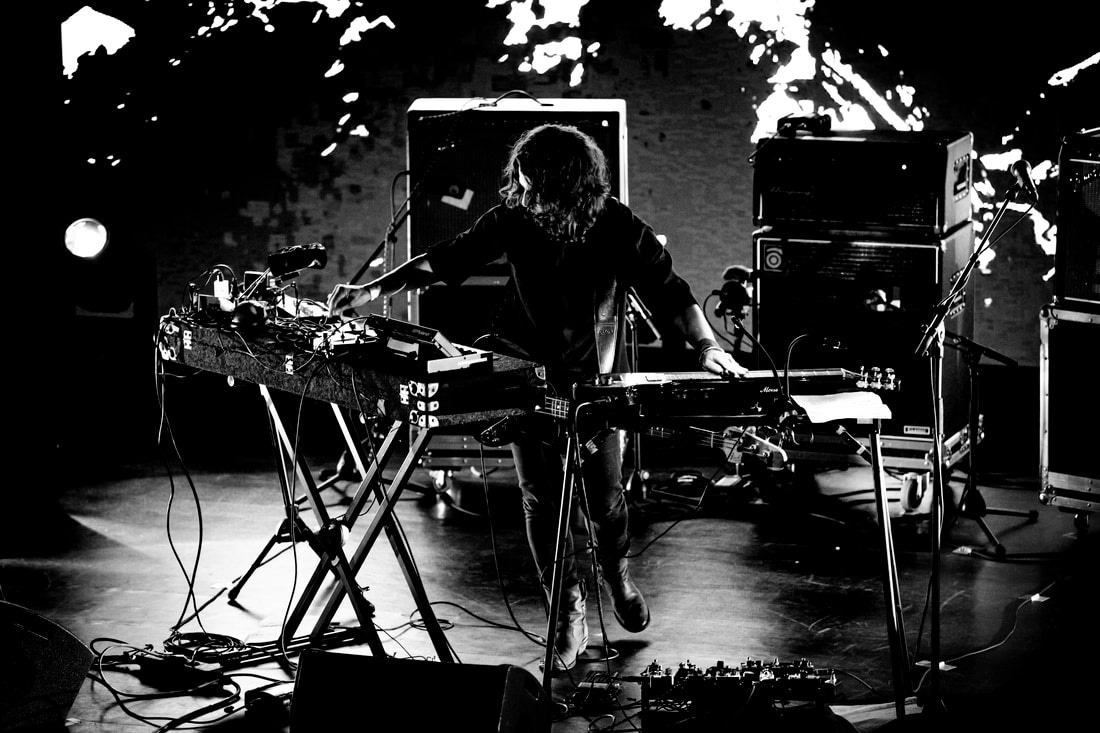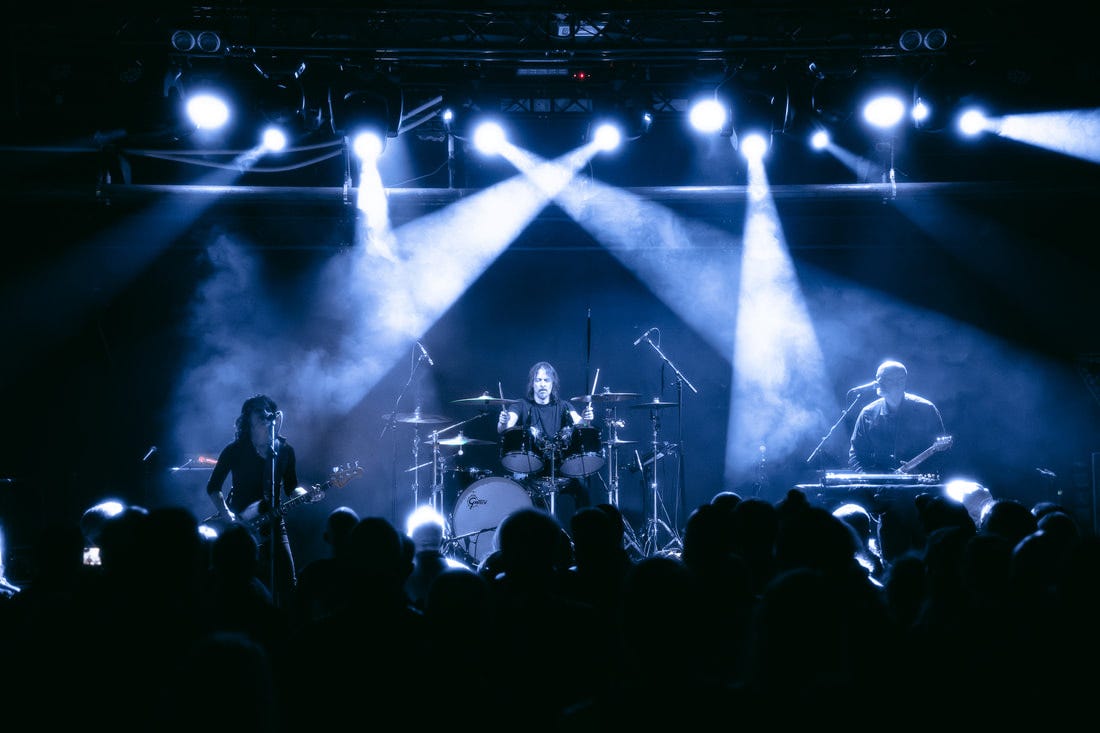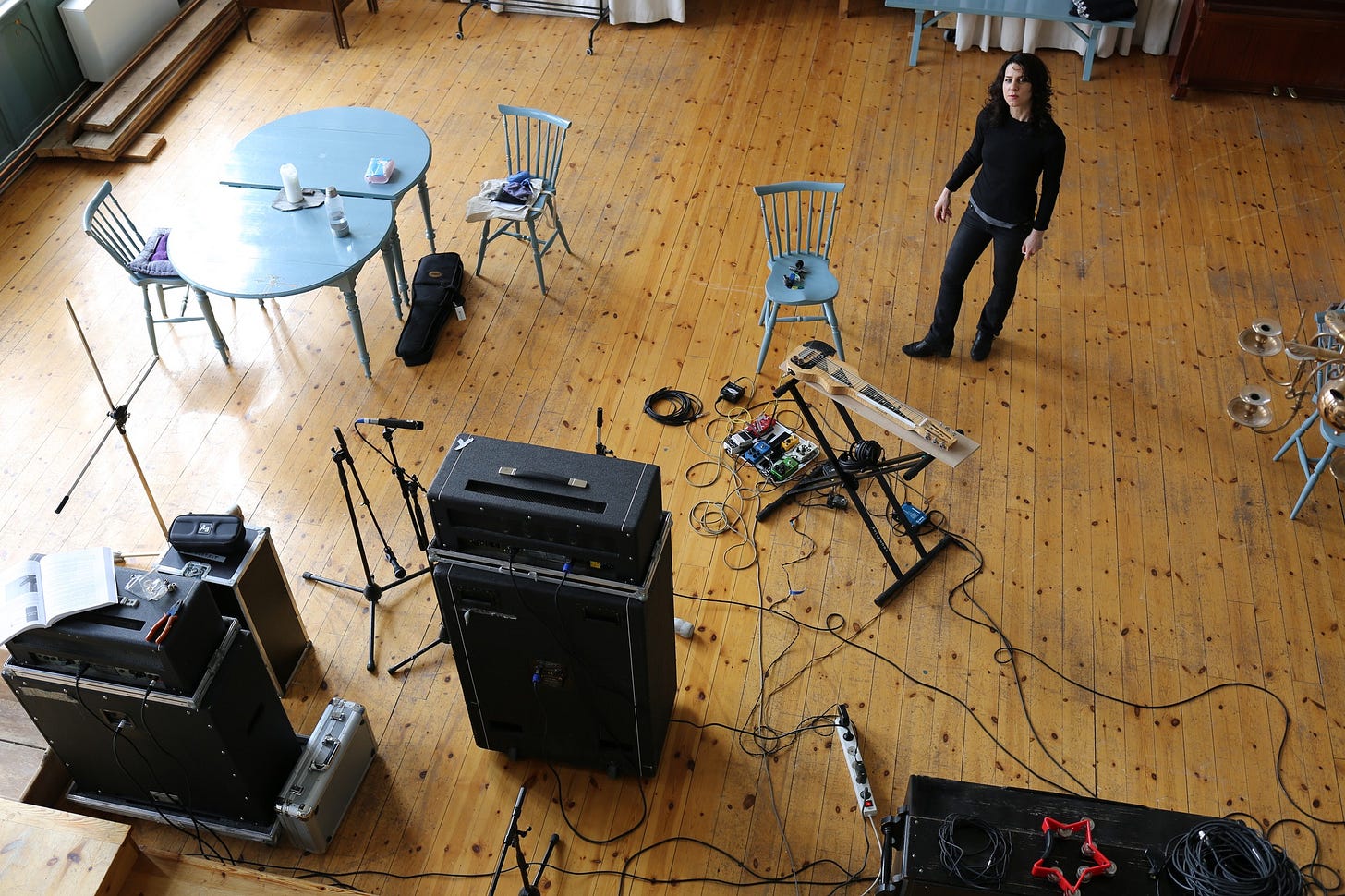Dana Schechter
An interview with bandleader and multi-instrumentalist Dana Schechter.
(Dana Schechter in performance; photo by Bart Verhelst)
I’m still kicking myself for not hanging out after the incredible performance by Swans here in Houston last April at White Oak Music Hall so I could reconnect with Dana Schechter, who plays bass and lap steel in the band. (I got one of those “Hey, where were you?” texts from Dana after the show. Argh!) Dana, who is based in Berlin, and like every independent artist I know if busy as hell, agreed to field a handful of questions from me for Night and Day. On her website, Dana writes, “I have a special interest in music that defies genres and embraces experimentation and exploration, both sonically and compositionally.” It’s a statement that resonates with me and aligns with the range of creative endeavors I wish to explore on this platform.
I met Dana around 1998, shortly after my wife and I had relocated from New Orleans to New York City. My good friend Lynn Wright was playing electric guitar and lap steel in her newly formed band, Bee and Flower, which included co-founding members Ani Cordero on drums and backing vocals, Roderick Miller on piano and keyboards, and Jon Petrow on viola and violin. The music as heard in Bee and Flower’s first incarnation was carefully arranged, at times gentle, at times tense, and occasionally explode into artfully controlled bursts of noise, the kinds of cadences I will always associate with New York City. (Once we’d settled in Brooklyn and later, Long Island City, my own music got louder. Dana, Lynn, and Jon appear on my album Saints and Devils.)
Fast forward to 2011, and Dana’s Berlin-based solo project, Insect Ark, couldn’t be more different sonically. Featuring Dana on bass, lap steel, synth, and vocals, and drummer Tim Wyskida (Khanate, Blind Idiot God), the music is cavernous, visceral, and grindingly slow, but never without a groove. In March, Insect Ark begins a European tour, with Lynn on board playing lap steel.
In this interview Dana talks about her initial forays into leading a band, the visual nature of music making, and the changes she and so many other musicians I know have weathered going back to 2000 and on up to the present day.
(Insect Ark, 2024; photo @e.lu.lu)
Was Bee and Flower your first band?
My first real band, or what I consider a real band, was called Gift Horse. It was an instrumental trio, formed in San Francisco, that played a mix of styles inspired by 90s noise rock and prog, like 70s-era King Crimson. The members were friends who I also have great respect for — Jef Whitehead of the Portland-based Black Metal one-man band, Leviathan, and Doug Hilsinger, who plays with lots of people and is a fine writer as well. Bee and Flower started once I moved to New York City in 1997 and started to get my feet wet as a songwriter and bandleader.
What were your aspirations then? Did you envision a full-time career path in music that included being signed to a label, recording and selling albums, and touring?
Initially, with Gift Horse, it was for fun. I can't say we were ambitious, except musically. We didn't understand many business things, labels, booking, touring, and PR, that musicians have to know now. It was pre-Internet! So we were reliant on the local scene. We were pretty much stuck locally and kind of floundered, which is a shame. After that, I decided to leave San Francisco for New York City to try to push my music career as well as my career as a motion graphics animator. I met Michael Gira from Swans and joined his other band, Angels of Light, right around the time I founded Bee and Flower.
What compelled you to relocate to Berlin?
I first moved here in the early 2000s to pursue Bee and Flower outside of New York, which had grown weary, especially in the aftermath of 9/11. We produced the album Last Sight of Land, which was a departure. It was a great experience, working with Larry Mullins (aka Toby Dammit) as a producer and Thomas Wydler of Bad Seeds on drums. A few members had stayed behind in New York as the band fractured a bit; the only people who came to Berlin were me, Rod Miller (keys), and Mullins. We reformatted the band here. I retired the project after the album Suspension in 2012.
(Dana Schechter; photo by Karin Park)
With Insect Ark, have your earlier goals evolved or changed beyond a desire to simply make music and realize your creative vision?
Insect Ark started as a vehicle to express myself in a way that was untarnished by years of working in a structured band environment. As an experimental solo band, one hasn't any rules or even considerations of what anyone else thinks. That was exactly what I needed after years of being in bands. It felt fresh and like I had a new lifeblood. Things feel stale if I do the same thing over and over. That said, I have always had the same goals: to take the sound inside me and give it a body, a shape, and by default, I think, or like to think, the music I make is rather original for that reason.
I do miss the days when I didn't know or care how things were going to go; I miss making art for the sake of it only. But those days will come again.
(The Collector; Dana Schechter: Animation, Directing, Compositing, Co-Producing; Alan Dubin: Editing, Co-Producing; Director of Photography: Shlomo Godder; Camera / Lighting / Prop Assistants: Chris Carlone, Richard Kim, Kevin Thomson.)
You are a gifted animator and designer. Is Insect Art as much a visual as it is a musical project?
Thank you, Chris. The visual side is really important to me and I labor over it a lot. I feel like music and visuals are natural extensions of each other. We humans respond so much to the varied inputs and they can change each other, contextually, very much.
Here’s an excerpt of what I wrote earlier about Insect Ark’s music: “The sonic texture is thickly layered, like a painting by Anselm Kiefer or a portrait by Frank Auerbach. This ain’t background music. It’s music designed to hit you both in the gut and the heart.”
Do you think of music in visual terms, or use visual language when working out or mixing songs?
Interesting. I use visual terms to describe music, for sure; it is useful to help stimulate imagination and interpretation, based on feeling and color, or movement like air, mist, hailstorm, and what have you.
Independent musicians these days have been very vocal about the economic challenges they face when it comes to touring, as well as recording. From your perspective, how has the landscape changed? What's gotten easier and/or become more difficult for musicians outside of pop music?
It's been extremely challenging. Being an artist gets pushed far into the background. The ability to self-promote and home recording has gotten easier, and for a casual or hobby artist, that's not a bad deal. For many who do this as their livelihood, it's rough. Touring can be so costly, it's prohibitive. The expense of manufacturing of merch is very high. Musicians are expected to create content as well as write and produce music, be a PR person, etc. Labels and other people in the business too are totally strapped trying to make it work.
We are all depending on the fact that people really LOVE music, and there are many solid supporters who don't want to see it die off. Perhaps there will be a new day coming when it all makes more sense and balances out.




